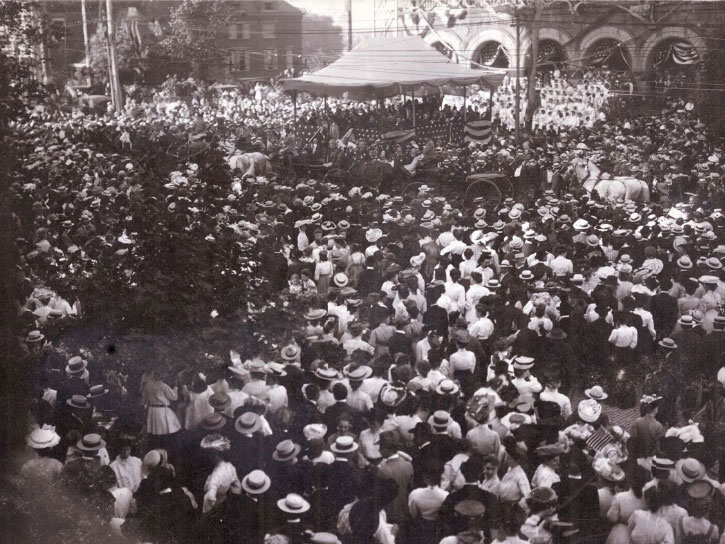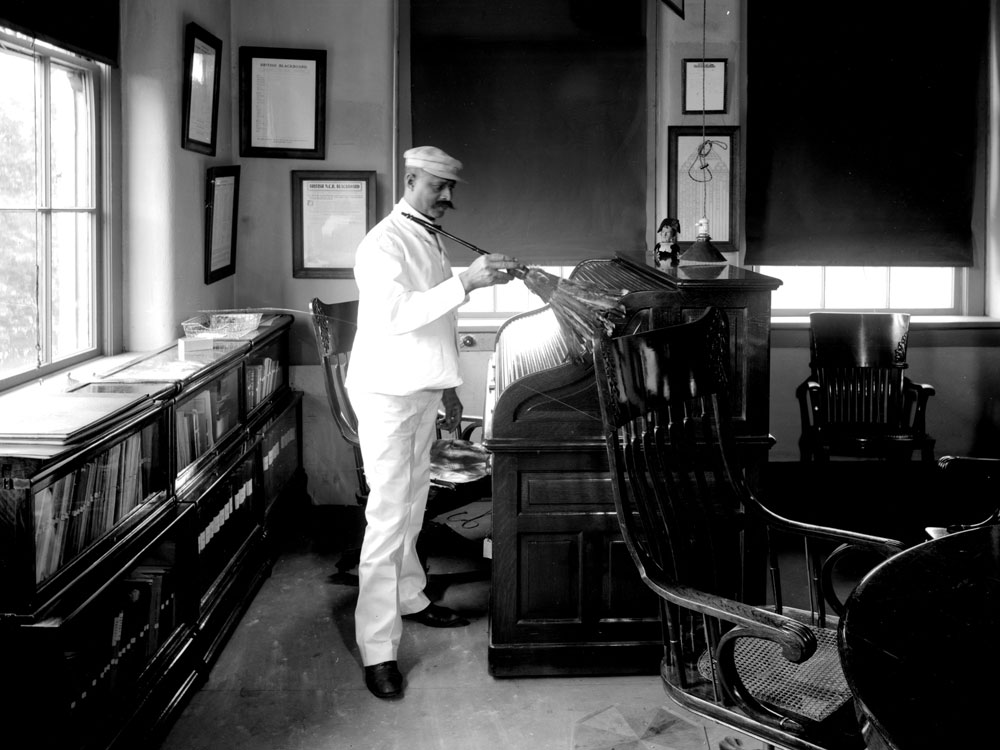On July 4, 1905, a Dayton newspaper published an ode that Paul Laurence Dunbar wrote in honor of the successful industrialist John H. Patterson, owner of the National Cash Register Company. The previous day, thousands of Daytonians gave an elaborate welcome to Patterson as he returned from a lengthy international trip.
Today a builder comes, one whom we know,
A dreamer, say you, of the long ago,
But ah, the dream's fulfillment is at hand,
And all in awe of the Creator's glow,
A city's people glad and thankful stand,
To welcome one who found it good to know,
And better yet to do,
The things that prove men noble, great and true.
"All Dayton Makes a Holiday to Greet John H. Patterson." The Dayton Journal (Dayton, Ohio). July 4, 1905. Page 1.
Dayton welcomes home John H. Patterson this afternoon. Never before in the history of the city have the citizens and public officials so aroused themselves. Thousands of yards of bunting and streamers hang from the buildings, lining the streets along the route which the escorting procession will pursue.
"City Decked in Gold and Crimson and Floating Flags." The Dayton Daily News (Dayton, Ohio). July 3, 1905. Page 10.
Returning after a year's absence, Mr. Patterson is met with a magnificent welcome. Under such leadership, our city need place no narrow limit upon its growth in education, in good citizenship, in love of beautiful homes, in art, in all the higher possibilities of life. The secret of Mr. Patterson's unique position in the community is that we have come to believe in his bigness of heart, his love of humanity, his absolute unselfishness of purpose.
"A Splendid Homecoming." The Dayton Evening Herald (Dayton, Ohio). July 4, 1905. Page 4.

Crowds of Daytonians at Steele High School welcome John H. Patterson, July 3, 1904. The Lutzenberger Picture Collection, Dayton Metro Library (Dayton, Ohio). MS 024 0053.
The celebration culminated with a program at Steele High School. Paul did not participate because of poor health, but his ode to Patterson was read by Rev. Dr. Merle H. Anderson. Afterward, the school principal wrote to Paul about the poem.
I was much impressed with the Rev. Anderson's reading of your Ode yesterday, and on looking it over in the morning paper I am still more impressed by its excellence. It is one of the best things you have done; it is brief, strong and to the point. I congratulate you on its success. May you achieve many more such.
William Werthner to Paul Laurence Dunbar, July 4, 1905. Paul Laurence Dunbar Papers, Ohio History Connection (Microfilm edition, Roll 1).
During his youth in Dayton, Paul worked at Patterson's company. Because he was Black, Paul was hired as a janitor. After Paul became famous, he returned to NCR and was given a hero's welcome.
Paul Laurence Dunbar, who has made an international reputation as a writer of verse, appeared before the hundreds of employees of the National Cash Register company Wednesday afternoon and gave several readings and recitations. He was enthusiastically received by the employees among whom he used to work as a member of the force of colored janitors. His first appearance at the factory in which he was a janitor several years ago was uniquely different from his appearance when he used to wear the white suit of the janitors.
"Like Return of a Hero." The Dayton Daily News (Dayton, Ohio). January 7, 1904. Page 2.

Janitor dusting the office of John H. Patterson at National Cash Register, 1902. Image provided by the NCR Archive at Dayton History. NCR.1998.CD16.
Several months after Dayton celebrated Patterson's homecoming, all of the Black employees at NCR were fired. About 80 janitors lost their jobs and were replaced by white workers. In a conciliatory gesture, Patterson offered gold coins to African American churches in the area, but his money was refused.
The management of the National Cash Register Company made a change in its janitor force on Friday afternoon by bringing in white men to take the places of the colored employees. The managers want every person working for the firm to have a chance for promotion through any of its various departments. Therefore, the company has decided to start good, bright boys in the positions that the colored men have filled so that they may be eligible for promotion in its service. This change in the janitor force will give 80 young men a chance to get into the company's service and show their various qualities. There is absolutely no hard feelings on the part of the company or its President towards colored people, as that gentlemen has a number of them employed at his home, and has no intention of dismissing them. At the factory, however, there was no chance for these colored men to advance.
"All Colored Employees are Dismissed at N. C. R." Dayton Evening Herald (Dayton, Ohio). December 30, 1905. Page 1.
On Friday the National Cash Register Company announced that it would discharge all its colored employees. On Friday evening, President Patterson asked Harry A. Pollard, who has been for sixteen years a faithful colored employee at the Officers' Club, and among those dismissed at the N.C.R., to come to his residence. After speaking about the situation at the N.C.R., Mr. Patterson gave him five twenty and two ten-dollar gold coins. He requested Mr. Pollard to deliver the donations to the several colored churches. This action was bitterly denounced in every local colored pulpit Sunday morning and a unanimous vote was taken by the different congregations to return the donation. Rev. W. O. Harper, pastor of the Zion Baptist Church, said: "Since all the factories of the country are looking at the N. C. R. as an ideal factory, they have set a bad precedent. We do not wish to dictate to this great company, but we do wish to show them that we are men. While we need money, we do not need money at the cost of manhood. The conscience of the colored churches cannot be covered by a twenty-dollar gold piece. If we die, we die men. We will not accept his $20 as 'hush money.'"
"Colored Churches Reject the Gifts Tendered by President Patterson." The Dayton Journal (Dayton, Ohio). January 1, 1906. Page 6.
Dayton, Ohio, January 1. -- The printers at the National Cash Register Works will not report for duty tomorrow, a strike having been ordered by the I. T. U. Last Saturday the company discharged all of its negro janitors and other colored help, giving the places to white men. Colored citizens are indignant, and refused to accept money donations made to local African churches by President Patterson, on the grounds that their self-respect would not allow them to take it.
"Dayton Printers." The Enquirer (Cincinnati, Ohio). January 2, 1906. Page 5.
